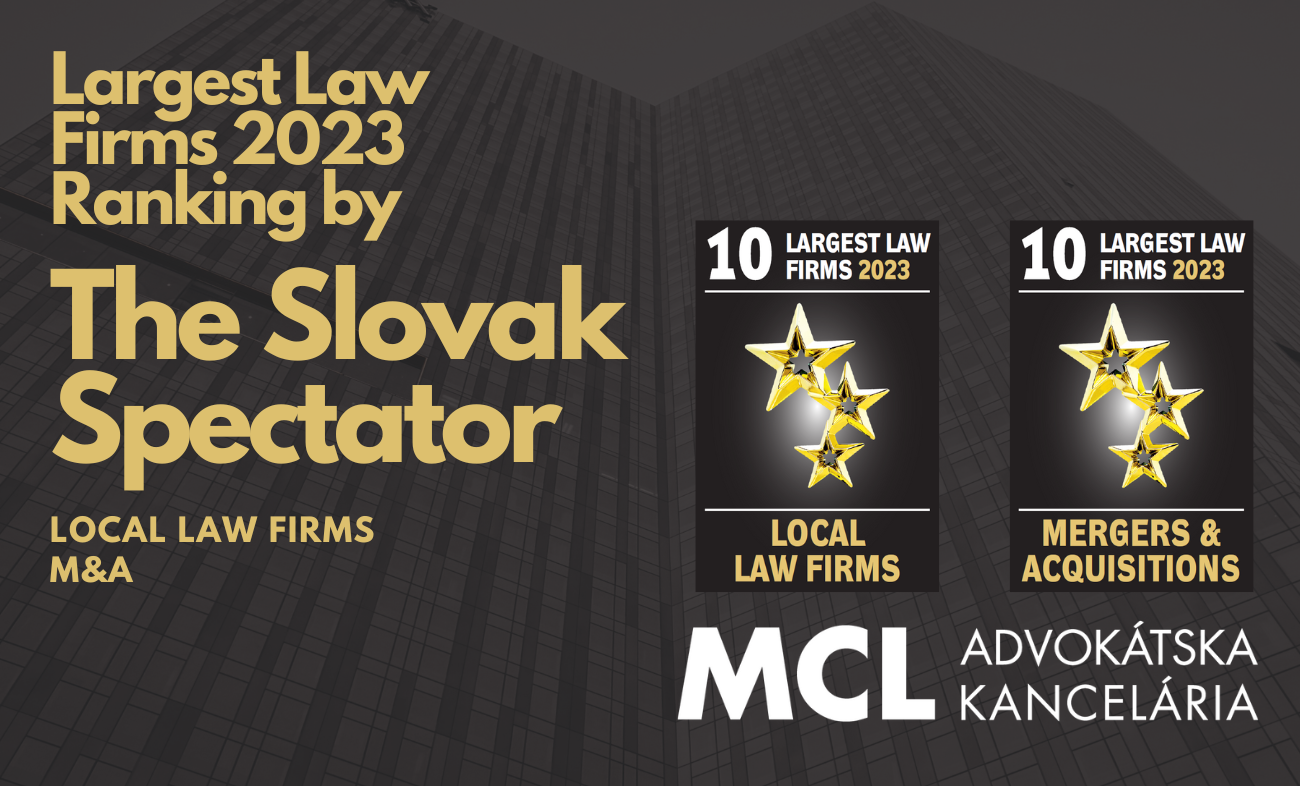
INTERVIEW WITH SLOVCA ABOUT OUR TRANSACTIONS AND STUMBLING BLOCKS OF PRIVATE EQUITY/VENTURE CAPITAL LEGISLATION
In a recent interview for SLOVCA, we had the opportunity to introduce our law firm, the landmark transactions we worked on last year, legal pain points we have come across and the direction of the Slovak private equity & venture capital market from a legal point of view.
SLOVCA: What field of advocacy is your primary focus and in which countries do you operate?
Martin Habán: MCL’s primary focus is on acquisitions, mergers, corporate law, real estate and construction & development. We also dedicate a large part of our agenda to private clients, tax law, litigation and financing. We’re based in Slovakia, but we have cooperating offices in other jurisdictions, such as in the Czech Republic, Poland, Hungary, Austria, Luxembourg, Malta, Cyprus and the United Arab Emirates. We can also cover other countries within our network of cooperating offices if the transaction requires it.
SLOVCA: In 2021 you worked on several interesting deals. Can you tell us more about them?
Vojtech Pálinkáš and Martin Jurečko: We advised the innovative entrepreneur and philanthropist Milan Dubec on the sale of Bistro.sk, the online food delivery service to JustEatTakeAway.com, the global online food delivery leader. This was said to be the largest e-commerce deal in Slovakia and the transaction was ranked by Slovak Spectator as one of the top two M&A transactions in Slovakia in 2021.
We also advised entrepreneur Pavel Jakubec on the comprehensive structuring of his acquisition of the remaining 50% stake in I.D.C. holding, the largest sweets and pastry manufacturer in Slovakia, and producer of the very popular wafer biscuits “horalky”. This transaction was shortlisted by CEE Legal Matters for the CEE Deal of the Year award in 2021.
We also represented our client Fun Media Group in its acquisition of a company that has the broadcasting license for “Radio Vlna” and were the transaction adviser to Marek Václavík and Petit Press management in acquiring a minority stake in the Petit Press publishing house from Penta. These deals were also very important and mentioned in Slovak Spectator ratings.
In the field of real estate, we advised MiddleCap in a joint venture with the Czech developer CPI Property Group on the acquisition and redevelopment of three projects in Berlin. MiddleCap’s real estate project involving the Southworks office building in London was named the smartest building in the world thanks to its technological and innovative features; it was also nominated for a MIPIM award. Southworks belongs to the portfolio of our notable real estate projects and we are very pleased with all the awards and nominations.
SLOVCA: What were the biggest legal obstacles you faced when working on deals and how would you recommendations amending such laws?
Vojtech Pálinkáš, Matej Firický and Simona Rapavá: Many obstacles stem from Slovak tax legislation and cause difficulties in the tax structuring of transactions. There are also deficiencies in the implementation of the EU directives by the Slovak Republic, especially with regard to the ban on financial assistance. Slovak legislation doesn’t allow the so-called whitewash procedure which causes significant complications in the acquisition financing of a target, joint-stock company and the structuring of transactions, which of course means additional costs for the client.
SLOVCA: Where do you see room for improvement in the PE / VC market in Slovakia?
We see room for improvement in relation to tax regulations, which have an impact on setting up PE / VC transactions in Slovakia. The newly introduced CFC rules applicable to individuals from 1 January 2022 is a good example. The application of these rules is unclear in several aspects and the competent authorities have not provided relevant guidelines. Whereas profits made by a company from the sale of shares are exempt from income tax, subject to the fulfilment of certain conditions (the so called participation exemption) (s), a similar benefit does not apply to individuals. Tax legislation sets also different limits for intra-company disposals (sales /contributions of assets or an enterprise, mergers, divisions of companies) and limits the deduction of tax losses.
SLOVCA: In conclusion, we would like to follow up on the previous question and ask, where do you see the advantages or disadvantages compared to countries with a long tradition of PE / VC investment?
Matej Firický and Martin Mičák: In relation to the aforementioned downsides or limitations of the Slovak tax legislation affecting PE / VC transactions, the Slovak Republic lags behind the rest of the CEE region as well as the EU. As a result, the surrounding jurisdictions (Czech Republic, Hungary) and even more distant destinations (Cyprus, Malta, possibly Luxembourg, UK) are often used because they are more appropriate for a transaction.
Also, as mentioned above, the implementation of EU directives by the Slovak Republic, such as the complete ban on financial assistance for a joint stock company without any whitewash procedure available in the neighbouring countries is insufficient.





